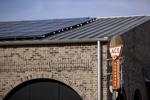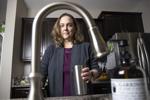Bluffton – Growing up on the Chesapeake Bay, Bobby Heuser Jr. would pull chicken necks into the water, tie them with rope, and let them down. When a blue crab bites, he carefully pulls up the line, a crabbing technique known as chicken necking.
“When I was a kid, in elementary school, you could go down, spend a few hours, and come home with enough for dinner,” he said. But by high school, he could soak all day at the best crab spot, a bag of chicken necks, and walk away empty-handed.
“The crabs are gone. The oysters have all been fished out and it’s made the bay murky. There’s rubbish. There’s plastic bags. Because there are so many people and there aren’t enough regulations to protect it,” he said.

When he, his father, Bob Heuser Sr., and his mother, Renee Heuser, were looking for a location to open their first Heuser Ace Hardware in 2013, they chose Bluffton because of its proximity to the May River.
Today they have 3 Heuser Ace Hardware stores and 1 Benjamin Moore paint store in the Lowcountry. After witnessing the decline of the Chesapeake Bay, they experienced firsthand the importance of protecting the natural resources around them.
“We really want to make progress on the environmental front with this company,” Heuser Jr. said.
But Heusers also understands that while small businesses may want to protect the environment, not everyone has the time, money or resources.
Last year, Heusers embarked on an 11-month journey to move two of their largest stores to solar. Even with the help of a $113,279 USDA grant, they don’t expect to see a return on investment in eight years.
“Unfortunately, developing a business plan for solar is very challenging,” Heuser Jr. said.
perfect condition
When looking for potential customers, Benny Mosiman, director of commercial sales for Alder Energy Systems, looks at maps of rural areas.
A federal grant to enable Heusers to convert to solar power is part of the Rural America Energy Initiative. To be eligible, small businesses must be located in rural areas.
“I looked at the areas in the USDA eligibility map to see if there were some roofs that were fine,” Mosiman explained.
Heusers’ flagship store in Bluffton and their location in Hardeeville are perfect for the solar conversation. They are located within USDA Qualified Zones and both have metal standing seam roofs.
“Those are ideal for solar. And he’s got no shade, so he’s a really good setup,” Mosiman said.
Another key factor that makes Heusers different from many small businesses is that they own their buildings and are free to make any modifications they want.

A federal grant partially paid for business owners to install solar panels on the roof of Ace Hardware in Bluffton on Jan. 1. 11th, 2023. Andrew J. Whitaker/staff
“I would say that every year we have a couple of solar companies that walk in, look at our roof and say, ‘Hey, you know you’re going to be perfect,'” Little Hauser said.
But every time the Heusers crunched the numbers, they couldn’t make the switch work financially. Then Mosiman told them about the grant.
The process of obtaining federal grants is not easy.
“We do suggest that people might want to seek out a consultant,” said Dennis Kemp, a USDA Rural Development Commercial and Cooperative Program Specialist.
But margins were so thin that Heusers couldn’t afford to hire a consulting firm. Thus, the federal forms fell into the hands of Bob Heuser Sr.
“He was hiding in his office for a long time,” Hauser Jr. said. Say.
Lots of time is a luxury that most small business owners don’t have.
Converting both of their buildings to solar will cost approximately $500,000. The federal grant will cover 25 percent of the cost and installation until the solar panels are fully installed and working. So the Heusers had to invest $500,000 in the belief that they would be approved for a grant.

“There’s been a big discussion around this. We’re comfortable getting funded. But there’s definitely a risk,” Heuser Jr said.
A risk that many small business owners may not be willing or able to take, no matter how much they want to protect the environment.
utility support
Another thing the Heusers do for them is the support of Palmetto Electric, the utility that provides electricity to 76,000 businesses and homes in the area.
As a cooperative, Palmetto Electric does not generate its own electricity. Instead, electricity is purchased from Duke Energy and Santee Cooper. Trey Hunter, vice president of marketing and public relations for Palmetto Electric, said the company sees solar as another way for customers to reduce energy costs, not unlike spray foam insulation or more efficient HVAC systems.
“We’re always working to lower our members’ bills through energy efficiency programs,” Hunter said.
Heusers’ stores have 100kW and 91.2kW rooftop solar arrays, which should be enough to power them. But in the summer, when temperatures rise, they expect to run short of capacity. However, summer will be balanced out by the cooler season, when they generate more electricity than needed.
Palmetto Electric runs a program where when they over-generate, electricity is pushed onto the grid and Heusers get credits that they can apply to the months they under-generate and have to pull from the grid.
Without access to the grid, the Heusers will have to purchase backup batteries for each location. In addition to adding cost, Heuser Jr. pointed out that batteries are bad for the environment.
“There are all kinds of problems surrounding that solution,” he said.
While some utilities may be reluctant to switch their customers to solar, Palmetto Electric sees it as a help, especially in areas like Bluffton and Hardeeville, where electricity demand is rising due to population booms. Temperatures in the Lowcountry dropped on Christmas Eve Below freezing, Duke was unable to meet demand and began rolling blackouts.
“It was bluebird day. The sun came out. We saw solar generation come into play. That helped improve the situation,” Hunt said.

Heusers’ solar system is expected to last 25 years. Being independent from the grid will insulate them from energy inflation, in addition to the savings they will see after the payback period is reached.
“We know what the cost of energy is going to be over the next 25 years. I think that’s going to be of interest to most businesses,” Heuser Jr. said.
Over the past few years, Palmetto Electric has seen more and more customers switching to solar power. In 2020, it performed about 30 solar conversions. The following year, that number climbed into the 40s. Last year, it achieved 55 conversions. But as the utility points out, the total number of conversions is only a small fraction of the customer base. About 90 percent of all solar conversations happen on smaller residential structures. Heusers’ setup is by far the largest of the Palmetto Electric systems.
“We don’t often see them that big,” Hunter said.
As part of the Lower Inflation Act, the Rural America Energy Program grant will now cover 40% of the total cost of converting to solar. Unfortunately, since the Heusers have already transitioned, they are not eligible for additional grants.
But Bobby Hauser Jr. The hope is that more grants will make it possible for more small businesses to switch to clean energy. He and his father are even willing to help business owners better understand what is a complex, expensive process.
“I’d love to talk to people about it,” Heather Jr. said. Say. “And I know my dad would love to talk about the engineering of it, and how it got through.”